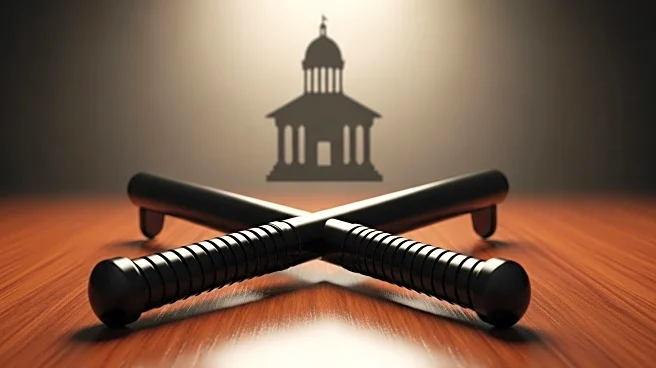What is the story about?
What's Happening?
The U.S. House of Representatives has passed two bills affecting Washington D.C.'s local governance. The first bill aims to roll back restrictions on police chases, allowing officers more discretion in pursuing suspects. This move comes despite opposition from D.C. officials who argue that the current restrictions are necessary for public safety. The second bill seeks to eliminate the D.C. Judicial Nominations Commission, which currently plays a role in recommending candidates for local judicial appointments. These legislative actions are part of a broader Republican-led effort to exert federal control over D.C.'s local policies, following President Trump's previous deployment of federal law enforcement in the city.
Why It's Important?
These legislative changes could significantly impact public safety and judicial processes in Washington D.C. By loosening restrictions on police chases, there is a potential increase in high-speed pursuits, which could lead to more accidents and legal liabilities for the city. The removal of the Judicial Nominations Commission could also lead to a more politicized process for appointing judges, potentially affecting the impartiality of the judiciary. These actions highlight the ongoing tension between federal authority and local autonomy in D.C., a city without voting representation in Congress, which complicates its ability to resist federal interventions.
What's Next?
The bills now face uncertain futures in the Senate, where they must pass to become law. D.C. Mayor Muriel Bowser and other local leaders are scheduled to testify before the House Oversight Committee, where they are expected to voice their opposition to these measures. The outcome of these legislative efforts could set a precedent for future federal interventions in D.C.'s local governance, potentially influencing similar actions in other U.S. territories or districts.
Beyond the Headlines
The broader implications of these legislative actions could include a shift in the balance of power between federal and local authorities, particularly in areas with unique governance structures like Washington D.C. The potential increase in police chases raises ethical concerns about public safety and the rights of individuals in high-speed pursuit scenarios. Additionally, the removal of local input in judicial appointments could lead to a judiciary that is less reflective of the community it serves, raising questions about representation and fairness in the legal system.
















